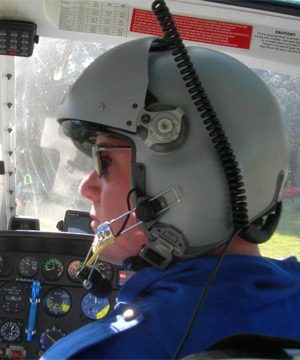Helicopter Pilot
Tasks & duties

Helicopter pilots may do some or all of the following:
-
study and prepare flight plans
-
check weather conditions before flights
-
check equipment and the condition of the helicopter
-
work out the amount of fuel needed for flights, and refuel and load the helicopter accordingly
-
brief passengers on safety and flight details
-
provide commentary to tourists during scenic flights
-
get clearance from air traffic control if flying in a regulated area, or send a message over the radio stating their flight plan
-
control the helicopter on the ground and in the air
-
study information from flight instruments
-
write reports and keep a flight log
Helicopter pilots fly for a variety of reasons, including search and rescue work, instructing, scenic work, heli-skiing, firefighting, charter work and logging.
Specialisations
Agricultural Helicopter Pilot
Agricultural helicopter pilots fly helicopters to apply agricultural chemicals or fertiliser to farm land.
Helicopter Pilot (Media)
Helicopter pilots who work in the media industry assist with aerial filming, news gathering, television production and aerial photography.
Helicopter Pilot (Tourism)
Helicopter pilots who work in the tourism industry take tourists on scenic tours by air, fly them to remote destinations or transport them between popular spots such as golf courses and fishing spots.
Rescue Helicopter Pilot
Rescue helicopter pilots search for and rescue people by air, fly people to a hospital or between hospitals, fight fires, or help the police and bomb squad.
Skills & knowledge

Helicopter pilots need to have:
-
excellent flying skills
-
knowledge of flight theory and flight planning
-
skill in interpreting flight plans and navigation data
-
understanding of civil aviation laws
-
knowledge of helicopter mechanics
-
an understanding of how weather affects flight
-
planning and decision-making skills
-
communication skills, especially when working in the tourism industry
-
record-keeping skills
Entry requirements
To become a helicopter pilot, you must have a Commercial Pilot Licence (Helicopter), or CPL-H. To obtain a CPL-H, you must:
-
be at least 18 years old
-
hold a current NZ Class 1 medical exam
-
hold a current NZ Private Pilot Licence (Helicopter)
-
pass CPL-H written exams
-
complete a minimum of 150 hours' flight time
-
satisfy the Civil Aviation Authority's (CAA) Fit and Proper Person requirement
-
pass the English Language Proficiency test
Aviation Careers website – more information on fit and proper person criteria
CAA website – Vector article on the English language proficiency test (PDF – 120KB)
CAA website – information on aeroplane or helicopter flight instructor licences and ratings (PDF – 218KB)
CAA website – how to be a pilot guide (PDF – 0.99MB)
Secondary education
Although there are no specific secondary educational requirements for becoming a helicopter pilot, Sixth Form Certificate or NCEA equivalent English, maths, computing and physics are helpful.
Tertiary education
Flight training is available at tertiary education institutions, aero clubs, flight training schools, the Royal NZ Air Force and the Royal NZ Navy.
Aviation Careers website – flight training organisations in New Zealand
Royal NZ Navy website – helicopter pilot training
Royal NZ Air Force website – pilot training
Training on the job
Every helicopter is different, so pilots need to be trained specifically for each aircraft. Because this takes the employer's time and money, some employers may require new pilots to take a lesser salary to pay for this on-the-job training. Other employers ask new pilots to pay a bond to supplement their training, which pilots will receive back once they have worked for the company for an agreed amount of time.
Helicopter pilots may also obtain qualifications or ratings in areas of helicopter flying such as instructing, agriculture, or flying using navigational instruments.
Every two years (or annually in some operations), helicopter pilots are required to fly with an instructor to check that their skills are up to the required standard, and that they are up to date with procedures.
Useful experience
Experience in the industry you aim to fly in is useful for helicopter pilots.
To work as a helicopter pilot in the tourism industry, it is helpful to gain experience working with tourists.
To work as a rescue helicopter pilot, working as a medic is useful.
Experience in the agriculture industry, such as working as a loader driver, is helpful if you wish to fly for the agriculture industry
Any flying, engineering, mechanical or meteorology experience is also useful.
Related courses
Aircraft Operation
For more information, please refer to Career Services.
Document Actions
